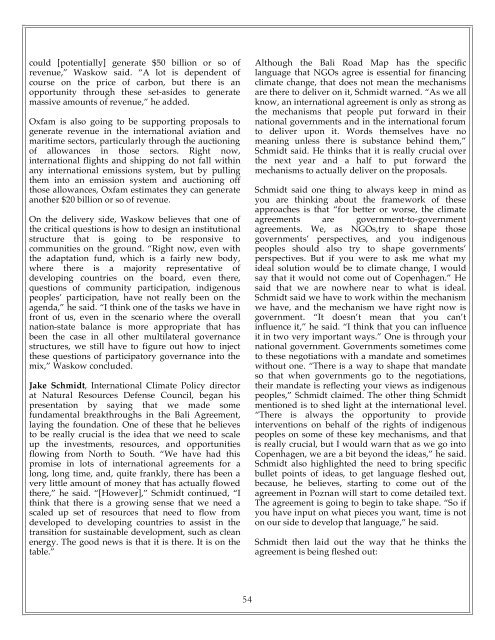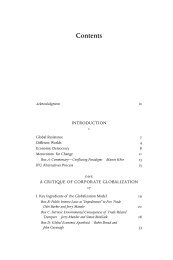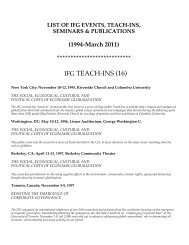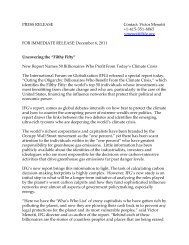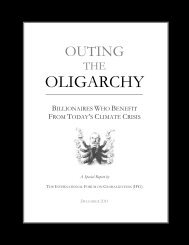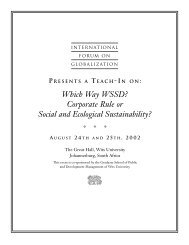UNDRIP Report - English FINAL - International Forum on Globalization
UNDRIP Report - English FINAL - International Forum on Globalization
UNDRIP Report - English FINAL - International Forum on Globalization
You also want an ePaper? Increase the reach of your titles
YUMPU automatically turns print PDFs into web optimized ePapers that Google loves.
could [potentially] generate $50 billi<strong>on</strong> or so of<br />
revenue,” Waskow said. “A lot is dependent of<br />
course <strong>on</strong> the price of carb<strong>on</strong>, but there is an<br />
opportunity through these set-asides to generate<br />
massive amounts of revenue,” he added.<br />
Oxfam is also going to be supporting proposals to<br />
generate revenue in the internati<strong>on</strong>al aviati<strong>on</strong> and<br />
maritime sectors, particularly through the aucti<strong>on</strong>ing<br />
of allowances in those sectors. Right now,<br />
internati<strong>on</strong>al flights and shipping do not fall within<br />
any internati<strong>on</strong>al emissi<strong>on</strong>s system, but by pulling<br />
them into an emissi<strong>on</strong> system and aucti<strong>on</strong>ing off<br />
those allowances, Oxfam estimates they can generate<br />
another $20 billi<strong>on</strong> or so of revenue.<br />
On the delivery side, Waskow believes that <strong>on</strong>e of<br />
the critical questi<strong>on</strong>s is how to design an instituti<strong>on</strong>al<br />
structure that is going to be resp<strong>on</strong>sive to<br />
communities <strong>on</strong> the ground. “Right now, even with<br />
the adaptati<strong>on</strong> fund, which is a fairly new body,<br />
where there is a majority representative of<br />
developing countries <strong>on</strong> the board, even there,<br />
questi<strong>on</strong>s of community participati<strong>on</strong>, indigenous<br />
peoples’ participati<strong>on</strong>, have not really been <strong>on</strong> the<br />
agenda,” he said. “I think <strong>on</strong>e of the tasks we have in<br />
fr<strong>on</strong>t of us, even in the scenario where the overall<br />
nati<strong>on</strong>-state balance is more appropriate that has<br />
been the case in all other multilateral governance<br />
structures, we still have to figure out how to inject<br />
these questi<strong>on</strong>s of participatory governance into the<br />
mix,” Waskow c<strong>on</strong>cluded.<br />
Jake Schmidt, <str<strong>on</strong>g>Internati<strong>on</strong>al</str<strong>on</strong>g> Climate Policy director<br />
at Natural Resources Defense Council, began his<br />
presentati<strong>on</strong> by saying that we made some<br />
fundamental breakthroughs in the Bali Agreement,<br />
laying the foundati<strong>on</strong>. One of these that he believes<br />
to be really crucial is the idea that we need to scale<br />
up the investments, resources, and opportunities<br />
flowing from North to South. “We have had this<br />
promise in lots of internati<strong>on</strong>al agreements for a<br />
l<strong>on</strong>g, l<strong>on</strong>g time, and, quite frankly, there has been a<br />
very little amount of m<strong>on</strong>ey that has actually flowed<br />
there,” he said. “[However],” Schmidt c<strong>on</strong>tinued, “I<br />
think that there is a growing sense that we need a<br />
scaled up set of resources that need to flow from<br />
developed to developing countries to assist in the<br />
transiti<strong>on</strong> for sustainable development, such as clean<br />
energy. The good news is that it is there. It is <strong>on</strong> the<br />
table.”<br />
Although the Bali Road Map has the specific<br />
language that NGOs agree is essential for financing<br />
climate change, that does not mean the mechanisms<br />
are there to deliver <strong>on</strong> it, Schmidt warned. “As we all<br />
know, an internati<strong>on</strong>al agreement is <strong>on</strong>ly as str<strong>on</strong>g as<br />
the mechanisms that people put forward in their<br />
nati<strong>on</strong>al governments and in the internati<strong>on</strong>al forum<br />
to deliver up<strong>on</strong> it. Words themselves have no<br />
meaning unless there is substance behind them,”<br />
Schmidt said. He thinks that it is really crucial over<br />
the next year and a half to put forward the<br />
mechanisms to actually deliver <strong>on</strong> the proposals.<br />
Schmidt said <strong>on</strong>e thing to always keep in mind as<br />
you are thinking about the framework of these<br />
approaches is that “for better or worse, the climate<br />
agreements are government-to-government<br />
agreements. We, as NGOs,try to shape those<br />
governments’ perspectives, and you indigenous<br />
peoples should also try to shape governments’<br />
perspectives. But if you were to ask me what my<br />
ideal soluti<strong>on</strong> would be to climate change, I would<br />
say that it would not come out of Copenhagen.” He<br />
said that we are nowhere near to what is ideal.<br />
Schmidt said we have to work within the mechanism<br />
we have, and the mechanism we have right now is<br />
government. “It doesn’t mean that you can’t<br />
influence it,” he said. “I think that you can influence<br />
it in two very important ways.” One is through your<br />
nati<strong>on</strong>al government. Governments sometimes come<br />
to these negotiati<strong>on</strong>s with a mandate and sometimes<br />
without <strong>on</strong>e. “There is a way to shape that mandate<br />
so that when governments go to the negotiati<strong>on</strong>s,<br />
their mandate is reflecting your views as indigenous<br />
peoples,” Schmidt claimed. The other thing Schmidt<br />
menti<strong>on</strong>ed is to shed light at the internati<strong>on</strong>al level.<br />
“There is always the opportunity to provide<br />
interventi<strong>on</strong>s <strong>on</strong> behalf of the rights of indigenous<br />
peoples <strong>on</strong> some of these key mechanisms, and that<br />
is really crucial, but I would warn that as we go into<br />
Copenhagen, we are a bit bey<strong>on</strong>d the ideas,” he said.<br />
Schmidt also highlighted the need to bring specific<br />
bullet points of ideas, to get language fleshed out,<br />
because, he believes, starting to come out of the<br />
agreement in Poznan will start to come detailed text.<br />
The agreement is going to begin to take shape. “So if<br />
you have input <strong>on</strong> what pieces you want, time is not<br />
<strong>on</strong> our side to develop that language,” he said.<br />
Schmidt then laid out the way that he thinks the<br />
agreement is being fleshed out:<br />
54


